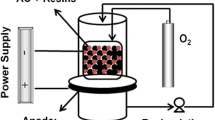Abstract
Activated carbon is a common adsorbent material for the retention of organic and inorganic contaminants. The spent activated carbon is usually regenerated with a thermal process. The electrochemical regeneration of the activated carbon has been proposed as an efficient and sustainable alternative to the classical reactivation methods. The electrochemical treatment consumes less energy and produces less CO2 than the traditional thermal activation. The electrochemical regeneration uses a DC electric current directly applied to the carbon specimen. The electric current desorbs and mobilizes the contaminants retained in the activated carbon. At the end of the regeneration process, the contaminants released from the carbon remain in the electrode solutions (anolyte and catholyte). Such end-waste effluents require treatment before their final disposal. This work analyzed the chemical composition of the end-waste effluents and proposed and tested various technologies for the separation/degradation of organic and inorganic contaminants. Furthermore, the end-waste effluents may contain valuable materials: metals, phosphorus, specific organics, etc., that can be recovered using various selective separation processes.
Access this chapter
Tax calculation will be finalised at checkout
Purchases are for personal use only
Similar content being viewed by others
References
McQuillan RV, Stevens GW, Mumford KA (2018) The electrochemical regeneration of granular activated carbons: a review. J Hazard Mater 355:34–49
García-Otón M, Montilla F, Lillo-Ródenas MA, Morallon E, Vázquez JL (2005) Electrochemical regeneration of activated carbon saturated with toluene. J Appl Electrochem 35(3):319–325
Cameselle C, Gouveia S (2018) Treatment of end-waste effluent from the electrokinetic reactivation of activated carbon. In: Book of abstracts of the XVI international symposium on electrokinetic remediation. Çanakkale, Turkey, p 13
Author information
Authors and Affiliations
Corresponding author
Editor information
Editors and Affiliations
Rights and permissions
Copyright information
© 2020 Springer Nature Switzerland AG
About this paper
Cite this paper
Cameselle, C., Gouveia, S. (2020). Electrokinetic Reactivation of Activated Carbon: Possibilities for the Treatment of the End-Waste Effluents. In: Reddy, K.R., Agnihotri, A.K., Yukselen-Aksoy, Y., Dubey, B.K., Bansal, A. (eds) Sustainable Environmental Geotechnics. Lecture Notes in Civil Engineering, vol 89. Springer, Cham. https://doi.org/10.1007/978-3-030-51350-4_1
Download citation
DOI: https://doi.org/10.1007/978-3-030-51350-4_1
Published:
Publisher Name: Springer, Cham
Print ISBN: 978-3-030-51349-8
Online ISBN: 978-3-030-51350-4
eBook Packages: EngineeringEngineering (R0)




